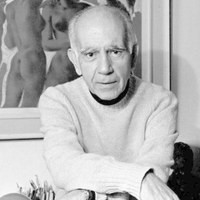Cruz Alta, 1905 – Porto Alegre (Brasil), 1975
By Flávio Aguiar
Memory and history converge in the essence of Érico Veríssimo’s work, starting with his first novel, Clarissa (1933). However, it is in the trilogy O tempo e o vento (The Time and the Wind) (O continente, O retrato, and O arquipélago) (1949-1962) that these elements solidify. The novels vividly illustrate the historical trajectory of the country, focusing on the state of Rio Grande do Sul and reflecting the transformations that solidified in Latin American literature that emerged shortly after World War II. The clear language, with a documentary tone, reveals the social and political differences of Brazilian reality through the narratives of urban and rural characters.
Committed to freedom, the writer from Rio Grande do Sul was labeled a communist for Caminhos cruzados (Crossed Paths) (1935), in which he highlighted the contrast between wealth and poverty, and at times regarded as alienated for refusing to “transform the novel into a political pamphlet.” Grounded in prose, his literature includes short stories, children’s tales, young adult narratives, and almost theatrical works, such as those gathered in his debut book, Fantoches (Puppets) (1932).
Journalism, translation, and editorial work significantly shaped his career from the outset in 1930, when he took over the Revista do Globo in Porto Alegre and interacted with writers like Mário Quintana and Augusto Meyer. He contributed to the Sunday editions of the gaucho newspapers Diário de Notícias and Correio do Povo. His first translation was of Edgar Wallace’s The Sineer, followed by a series of titles.
It was with his second novel, Música ao longe (Music from Afar), that he received the Prêmio Machado de Assis alongside Dionélio Machado (Os ratos), Marques Rebelo (Marafa), and João Alphonsus (Totônio Pacheco). Other awards include the Jabuti (1966) and the Literary Personality of the Year (Pen Club, 1972). His familiarity with English-speaking culture and his passion for Brazilian literature led him to the United States as a university professor and lecturer. He authored travel books, notably México (1957). To this day, he serves as an inspiration and reference for writers in southern Brazil, such as Luís Antônio de Assis Brasil, Sérgio Faraco, and others. Other works include O prisioneiro (The Prisoner) (1967) and Incidente em Antares (Incident in Antares) (1971).



